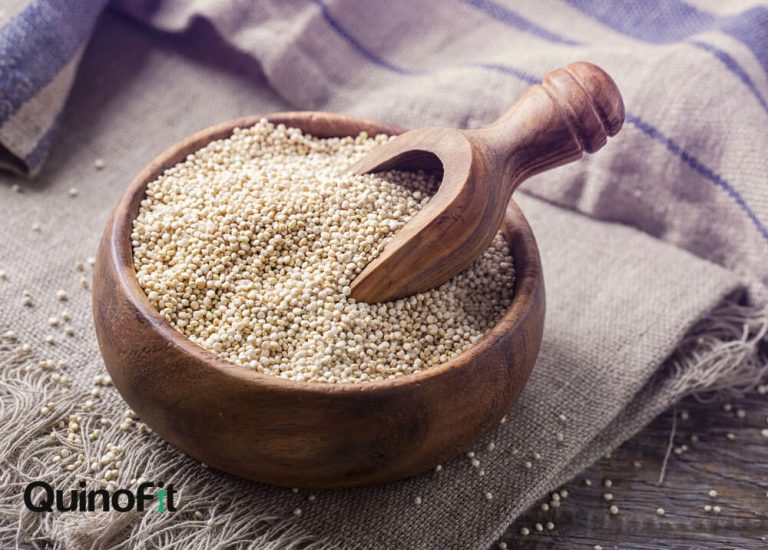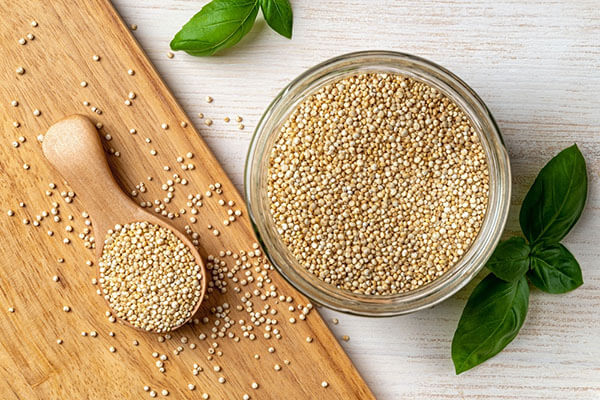Quinoa is a pseudo-cereal that is considered an exceptional food. This plant seed has suitable calorie content and high nutritional value. Not only is it gluten-free, but it also contains more protein, vitamins, minerals, and fiber compared to regular grains and seeds. As a result, it can be satiating, help reduce calorie intake, and at the same time, provide your body with essential nutrients. Below, we will examine the calorie content of quinoa and provide a comprehensive table of its nutritional value.
How much is the nutritional value of quinoa?
Although quinoa is often classified with grains like wheat and oats, it is actually a pseudo-cereal. In other words, quinoa is essentially a seed that is prepared and consumed similarly to grains. Black quinoa and amaranth are other examples of pseudo-cereal seeds.
Quinoa contains beneficial nutrients such as fiber, antioxidants, vitamins, and minerals. This product is also a source of manganese, iron, folate, magnesium, phosphorus, potassium, B6, copper, and riboflavin.
One cup of cooked quinoa contains 222 calories, 8 grams of protein, 4 grams of fat, 39 grams of carbohydrates, and 5 grams of fiber. According to nutrition experts, adding quinoa to your diet can aid in weight loss. The mentioned nutritional values are for 1 cup (185 grams) of cooked quinoa. Next, we will examine the nutritional values of 100 grams of raw and cooked quinoa.
Suggested further reading: What are the benefits of quinoa?
Table of nutritional value for 100 grams of cooked and raw quinoa.
Cooked quinoa | amount(g) |
calories | 120 |
Water | 72% |
Protein | 4.4 |
carbohydrate | 21.3 |
Suger | 0.9 |
Fiber | 2.8 |
Fat | 1.9 |
raw quinoa | amount(g) |
calories | 368 |
Protein | 14.1 |
carbohydrate | 64.2 |
Fiber | 7 |
Fat | 6.1 |
Does quinoa cause weight gain?
In response to this question, it should be noted that considering the calorie content, fiber, carbohydrates, and nutritional value of quinoa, this plant seed not only does not cause weight gain but is also used in weight loss diets. For example, the fiber and carbohydrates present in quinoa contribute to a feeling of fullness, preventing overeating.
Furthermore, a clinical trial conducted by researchers at La Trobe University in Melbourne, Australia, showed promising results regarding the effects of this pseudo-cereal in reducing cholesterol and triglyceride levels.
Calorie and nutritional value of cooked and raw quinoa
Jonathan Wald, a nutrition specialist and spokesperson for the New York Academy of Nutrition and Dietetics, states that the excessive use of quinoa does not have a high calorie content. This means that consuming larger volumes of quinoa can lead to increased satiety, which can aid in weight loss.
Nutritional value of cooked quinoa | daily requirement |
21g total carbohydrates | 7% |
3g Fiber | 11% |
0.9g Suger | |
4g Protien | |
Calcium | 1% |
Manganese | 32% |
iron | 8% |
2g total fat | 3% |
0mg Cholesterol | 0% |
7mg sodium | 0% |
72mg potassium | 5% |
Vitamin A | 0% |
Vitamin C | 0% |
copper | 10% |
The carbohydrate content of quinoa
Quinoa is not low in carbohydrates. One cup of cooked quinoa contains over 39 grams of carbohydrates. This amount is 50% more than the same amount of brown rice and roughly equivalent to the carbohydrate content in white rice.
If you have type 2 diabetes or blood sugar issues, it is better to be mindful of your carbohydrate intake. However, it’s interesting to note that not all carbohydrates are created equal. Quinoa is considered a whole grain pseudo-cereal, which is better for you than refined grains like white flour.
The fiber content of quinoa
Every cup of cooked quinoa contains five grams of fiber. Generally, a high-fiber diet is considered suitable for weight loss efforts. Adequate fiber intake keeps you fuller for longer, reducing the likelihood of overeating during meals or snacks.
The sugar content of quinoa
Quinoa has less than one gram of sugar per 100 grams when cooked. It is a combination of maltose, galactose, and ribose, which helps control blood sugar.
The protein content of quinoa
Quinoa is also rich in protein, with approximately 15 grams of protein per 100 grams. Compared to grains like rice and corn, it has exceptionally high protein content. Additionally, quinoa protein contains all nine essential amino acids, making it a complete protein.
Furthermore, the biological value of quinoa protein (the amount of protein absorbed by the body) is 73%. It is worth noting that this value is equivalent to 74% for beef, 49% for wheat, and 36% for corn.
This is particularly good news for vegans, vegetarians, or individuals who want to meet their protein needs without relying on meat.
Protein is an essential component that should be included in every meal and snack. The body requires more calories to digest and absorb protein, which can aid in weight loss. Since protein is digested at a slower rate, it can help stabilize your blood sugar levels and control hunger.
The fat content of quinoa
While quinoa is not high in fat, it still contains a small amount. One cup of quinoa contains 3.5 grams of fat, which is equivalent to about half a teaspoon of olive oil. The fat composition of quinoa is mostly unsaturated fats, which are beneficial for the heart.
Is quinoa effective for healthy weight gain?
For healthy weight gain, a good food should have certain characteristics:
– Rich in nutrients
– Adequate calorie content
– Good and balanced amount of protein
– Low in saturated fats
– Good amount of complex carbohydrates
Quinoa meets all of these criteria. Quinoa seeds contain all nine essential amino acids, are gluten-free, and are rich in various minerals, vitamins, and antioxidants. Therefore, it can certainly be beneficial for any dietary regimen. As mentioned, quinoa can also be used for weight loss as it is high in protein, fiber, and complex carbohydrates.
It is important to note that we cannot solely rely on one food to increase weight and build muscle. Our body requires a variety of foods. However, if you are looking to gain weight, quinoa can be one of the foods that can help you in your diet.
Vitamins and Minerals in Quinoa
One of the reasons to include quinoa in your daily diet is that it is considered a complete food. Quinoa is a complete protein source. This plant seed contains a good amount of all essential amino acids that the body cannot produce on its own and needs to obtain through the diet. Quinoa contains 13% of the daily value of vitamin B6 and 8% of vitamin E per cup (185 grams). Some of the vitamins and minerals present in quinoa and their benefits are as follows:
Vitamin B1
This vitamin helps convert food into usable energy for the body and aids in tissue repair. For example, during exercise, small tears occur in muscle fibers, and thiamine helps in their repair.
Vitamin B6
This vitamin helps in the breakdown of muscle glycogen, a type of carbohydrate stored in muscles for energy. So, when you are exercising, this vitamin is responsible for breaking down that energy for the muscles to use.
Magnesium
Magnesium plays a vital role in regulating sleep. Studies have shown that individuals who consume magnesium before bed combat symptoms of insomnia.
Copper and Iron
Copper, along with iron, helps in the formation of red blood cells. They are responsible for transporting oxygen and nutrients to tissues. In fact, copper and iron are responsible for ensuring that the body receives sufficient oxygen and nutrients.
Please note that while the translation has been done to the best of my ability, there can be slight variations in the interpretation of certain terms or values.
Food Products Based on Quinoa in the Diet
While quinoa has been cultivated and consumed for thousands of years, researchers, dietitians, and nutrition experts have recently become aware of its importance. This product is low in calories and beneficial for everyone who intends to lose or gain weight.
If you aim to lose weight, this plant seed possesses satiating properties and high nutritional value. Additionally, if you decide to gain weight, it serves as a good source of omega-3, various carbohydrates, proteins, and vitamins.
As mentioned in this article, quinoa is a highly nutritious and beneficial product. We have utilized the knowledge and skills of professional experts to produce quinoa-based products, including cookies, chips, puffs, and other processed items.
Frequently Asked Questions
Is quinoa lower in calories compared to rice?
Yes, the cooked quinoa has 120 calories, which is less compared to rice.
How much quinoa is better to consume daily?
There is no specific limitation for quinoa consumption.
Does quinoa cause weight gain?
No, cooked quinoa provides long-term satiety, thus aiding in weight loss.
Is the calorie content higher in cooked quinoa compared to raw?
No, the calorie content of cooked quinoa is lower than that of raw quinoa.
Does quinoa contain a high amount of fat?
No, if you consume cooked quinoa, it contains very little fat.
What is the amount of carbohydrates present in quinoa?
The amount of carbohydrates in cooked quinoa is 21.3 grams.
Does quinoa contain fiber?
Yes, quinoa is rich in fiber.
Does quinoa contain vitamins?
Yes, quinoa contains various vitamins.
These products, due to the use of valuable quinoa seeds, are much healthier than other regular samples. They have high nutritional value and can be incorporated as snacks and diet-friendly treats in your diet. If you have any questions regarding these products and their specifications, feel free to contact our experts.






